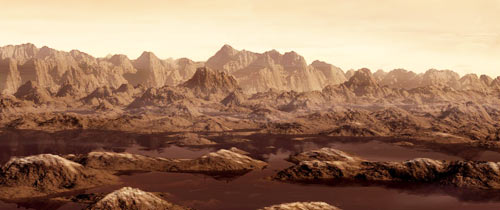 Life On Saturn's Moon Titan: Stand Well Back and Hold Your Nose! Research by astrobiologist William Bains suggests that if life has evolved on the frozen surface of Saturn's moon, Titan, it would be strange, smelly and explosive compared to life on Earth.
Life On Saturn's Moon Titan: Stand Well Back and Hold Your Nose! Research by astrobiologist William Bains suggests that if life has evolved on the frozen surface of Saturn's moon, Titan, it would be strange, smelly and explosive compared to life on Earth.
If life does exist on Saturn?s intriguing moon Titan, it probably stinks.
The icy moon has long been seen as a potential spot for extraterrestrial life, but so far, there?s no evidence of any living things there.
And if there were life on Titan, it would likely involve chemicals that are noxious and disgusting to humans, scientists say.
"This idea that you can walk up to the alien ambassador and shake their hand is very unlikely," said biochemist William Bains of MIT and the Cambridge, England-based Rufus Scientific. He explained that these other worldly life forms would probably be so foreign to us that it might be difficult to recognize them as life, and coming into contact with them could prove hazardous.
For example, Titan life's metabolism might involve chemical compounds such as phosphine and hydrogen sulfide, which are both foul-smelling gases that are toxic to humans.
"They're truly horrible chemicals ? to us," Bains told. "But if this sort of life did exist our sort of chemistry would be dangerous and reactive to them."
Toxic world
 Titan is a world very different from Earth. About twice as large as our moon, Titan is Saturn's largest satellite. It has a thick atmosphere of orange smog made mostly of nitrogen.
Titan is a world very different from Earth. About twice as large as our moon, Titan is Saturn's largest satellite. It has a thick atmosphere of orange smog made mostly of nitrogen.
Because it is about ten times as far from the sun as Earth, Titan is freezing, with a surface temperature of minus 292 degrees Fahrenheit (minus 180 degrees Celsius). At this temperature, water is permanently frozen solid. However, Titan is home to abundant liquid lakes of methane and ethane, which some scientists think could host alternative forms of life.
To research what life might be possible on this strange world, Bains and other scientists are testing which types of compounds would dissolve in methane and ethane, and they are using computational models to try to predict possible patterns of biochemistry on Titan.
"I've taken Titan as an example of a pretty extreme environment where clearly terrestrial biochemistry isn?t going to work," Bains said. "Life anywhere else that is radically different from earth is difficult to get your head around."
Boiling blood
Instead of relying on water as a primary ingredient for life, as Earthlings do, Titan's life might have blood based on liquid methane, Bains said. Such a creature couldn't survive on Earth, where methane is a gas at our warmer temperatures.
"Their blood would instantly boil then release this great cloud of chemicals, quite a number of which are quite poisonous," Bains said.
And instead of using the element carbon to build many of the molecules that make up life, these creatures' chemistry might be based on silicon. While this element is relatively flexible and able to bond with a wide variety of other elements, many of these bonds would be unstable. For example, some compounds that could be present in Titan life would spontaneously burst into flames if exposed to Earth's air.
Ultimately, scientists don't even know whether extraterrestrial life on Titan, or anywhere else in the universe for that matter, is even possible. But Bains said it's useful to research some of these questions so we might know what to look for, and understand more about the possibilities for life.
"I'm always hesitate to overstate how likely this sort of weird life is," Bains said. "But we have not yet ruled it out."
Bains plans to present his research at the Royal Astronomical Society's National Astronomy Meeting, which begins on Monday at the University of Glasgow in Scotland.
